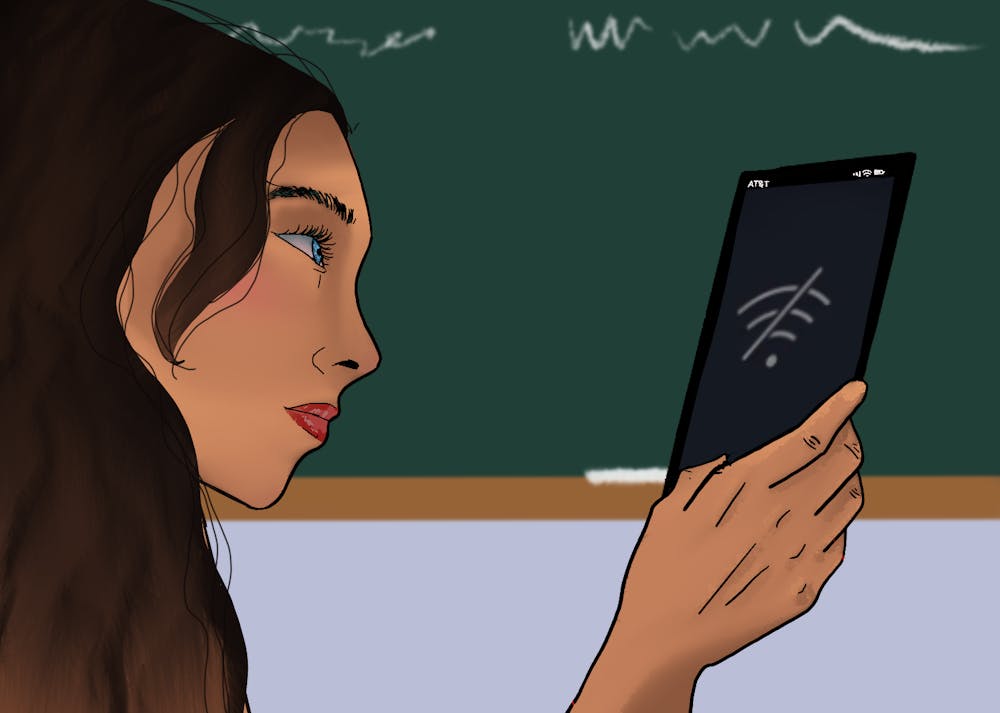Across the nation, universities are banning the immensely popular social media platform TikTok from school-operated Wi-Fi networks and devices. The short-form video-sharing app, owned by Chinese company ByteDance, has been under intense scrutiny for supposed cybersecurity breaches.
Arizona is not currently among the states who have issued a comprehensive ban on TikTok on government-operated or university-owned devices. I cannot say whether it will be added to this growing list, but I can say that I would fully support the barring of the platform from ASU's technology and internet.
In Arizona, Rep. Matt Gress, R-4, has proposed House Bill 2416. This bill is considered a "strike everything" amendment, as it currently contains writing that will later be replaced with different information on a new topic.
While the new bill describes the banning of "covered applications," it is clearly in reference to TikTok and ByteDance, citing an application "developed or provided by a private Chinese internet technology company founded on March 13, 2012."
If passed, this bill would require the state to remove any "covered application" from state information technology such as phones, computers or any other state-issued and owned electronic devices capable of internet connectivity.
Fountain Hills Councilmember Allen Skillicorn has already banned the app on town-operated devices and servers, citing the time-wasting algorithm and potential threats to national security. In a recent tweet, he urged fellow government officials, including Gov. Katie Hobbs, to follow in his footsteps. Hobbs has not yet responded to Skillicorn’s push.
Social media addiction is an ever-increasing issue for college-aged people, with 51% of individuals ages 18 to 24 reporting that they would find it difficult to give up social media according to Pew Research Center.
The TikTok algorithm only exacerbates this tendency towards addiction, acting as a superfood for the brain’s reward center by carefully dispersing short videos that will capture the user’s attention and keep them wanting more.
I find that I could easily spend over an hour a day mindlessly scrolling through TikTok. I’ve gone through periods of time where I’ve deleted the app — including now — however, the trends and humor circulating on the platform has always exacerbated my fear of missing out. I re-download it every time. When I come back to the platform, I am not simply giving the algorithm my time and attention. I am also giving the company copious amounts of data, which could be used for far more than deciding which videos to put on my “For You Page.”
TikTok's data collection strategies allow the app to gather user information such as contact lists and calendars. Additionally, it allows for hourly device geolocation and the scanning of both internal and external hard drives.
In October 2022, Forbes reported that ByteDance's Internal Audit team planned to collect multiple users' IP addresses for undisclosed purposes. The company did not disclose whether or not the targeted individuals were government officials, journalists, public figures or other prominent citizens. A TikTok spokesperson said that IP addresses are solely used for providing users with relevant content.
Squashing threats to national security is far more important than maintaining a highly replaceable app. Tensions surrounding the potential invasions of privacy from the Chinese government across the United States are rising due to the recent spy balloon that was shot down off the coast of South Carolina.
Bipartisanship is crucial when protecting our nation from this technological danger. This issue is not a partisan one and should not be thought of in that manner.
The privacy issues with TikTok were a priority during former President Donald Trump's tenure in office, threatening a complete ban across the United States in 2020. President Biden is also taking measures to address potential threats posed by the platform. In September 2022, Biden issued an executive order specifying risks that the Treasury Department’s Committee on Foreign Investment in the United States must keep in mind when evaluating foreign-owned companies.
Sen. Michael Bennet, D-CO, and Rep. Raja Krishnamoorthi, D-IL, have also joined the ranks of politicians calling for the ban of TikTok, further blurring party lines on this pervasive issue.
In terms of college students' attitudes, it’s easy for them to believe their data doesn’t matter because they have nothing crucial that could be used against them. This is far from the truth. TikTok’s collection of data to use how they wish poses an enormous national security risk for its over one billion users, regardless of their data contents.
However, ASU can put a small, yet crucial, dent in TikTok’s data collection.
As one of the top 10 largest universities in the U.S., ASU can set an example for schools across the nation by banning TikTok on University-owned Wi-Fi networks and devices. As of Fall 2022, enrollment across ASU’s campuses has reached 79,232 students, the vast majority of which utilize ASU Wi-Fi to complete their assignments on campus, and those who live on campus most likely use it as their primary network.
By banning TikTok on campus devices and Wi-Fi networks, ASU can protect its students’ safety. Due to the prominence of the University, both in size and propensity for innovation, other universities could follow suit, thus preventing TikTok-using students from having any more of their information absorbed into the app's vast database.
Edited by Kate Duffy, Jasmine Kabiri and Grace Copperthite.
Reach the columnist at sgkrantz@asu.edu and follow @selma_krantz on Twitter.
Editor's note: The opinions presented in this column are the author's and do not imply any endorsement from The State Press or its editors.
Want to join the conversation? Send an email to opiniondesk.statepress@gmail.com. Keep letters under 500 words and be sure to include your university affiliation. Anonymity will not be granted.
Like The State Press on Facebook and follow @statepress on Twitter.




